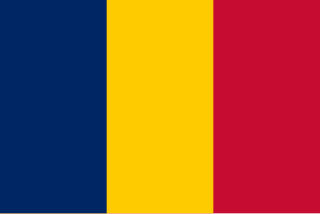
Chad, officially the Republic of Chad, is a landlocked country at the crossroads of North and Central Africa. It is bordered by Libya to the north, Sudan to the east, the Central African Republic to the south, Cameroon to the southwest, Nigeria to the southwest, and Niger to the west. Chad has a population of 16 million, of which 1.6 million live in the capital and largest city of N'Djamena.
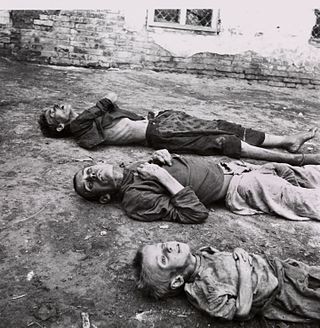
A famine is a widespread scarcity of food, caused by several factors including war, natural disasters, crop failure, widespread poverty, an economic catastrophe or government policies. This phenomenon is usually accompanied or followed by regional malnutrition, starvation, epidemic, and increased mortality. Every inhabited continent in the world has experienced a period of famine throughout history. During the 19th and 20th century, Southeast and South Asia, as well as Eastern and Central Europe, suffered the greatest number of fatalities. Deaths caused by famine declined sharply beginning in the 1970s, with numbers falling further since 2000. Since 2010, Africa has been the most affected continent in the world by famine.

The Sahel region or Sahelian acacia savanna is a biogeographic region in Africa. It is the transition zone between the more humid Sudanian savannas to its south and the drier Sahara to the north. The Sahel has a hot steppe climate and stretches across the southernmost latitudes of North Africa between the Atlantic Ocean and the Red Sea. Although geographically located in the tropics, the Sahel does not have a tropical climate.

A widespread famine affected Ethiopia from 1983 to 1985. The worst famine to hit the country in a century, it affected 7.75 million people and left approximately 300,000 to 1.2 million dead. 2.5 million people were internally displaced whereas 400,000 refugees left Ethiopia. Almost 200,000 children were orphaned.

Kabo is a town in the northern Central African Republic, lying north west of Kaga Bandoro. It is a market town and the border post for Chad.
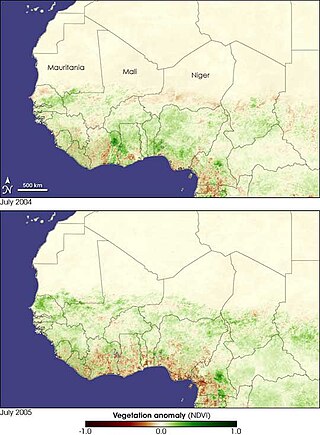
The 2005–2006 Niger food crisis was a severe but localized food security crisis in the regions of northern Maradi, Tahoua, Tillabéri, and Zinder of Niger from 2005 to 2006. It was caused by an early end to the 2004 rains, desert locust damage to some pasture lands, high food prices, and chronic poverty. In the affected area, 2.4 million of 3.6 million people are considered highly vulnerable to food insecurity. An international assessment stated that, of these, over 800,000 face extreme food insecurity and another 800,000 in moderately insecure food situations are in need of aid.

The Sahel region of Africa has long experienced a series of historic droughts, dating back to at least the 17th century. The Sahel region is a climate zone sandwiched between the Sudanian Savanna to the south and the Sahara desert to the north, across West and Central Africa. While the frequency of drought in the region is thought to have increased from the end of the 19th century, three long droughts have had dramatic environmental and societal effects upon the Sahel nations. Famine followed severe droughts in the 1910s, the 1940s, and the 1960s, 1970s and 1980s, although a partial recovery occurred from 1975-80. The most recent drought occurred in 2012.

Birao is the capital of Vakaga, one of the 14 prefectures of the Central African Republic and was an administrative post in the colony of Ubangui-Shari. In March 2007, the town was almost completely burnt down in the fighting between rebels and government troops in the area.

Chad–United States relations are the international relations between Chad and the United States.

Railway stations in Zambia include:

Lesbian, gay, bisexual and transgender (LGBT) people in Mozambique face legal challenges not faced by non-LGBT people. Same-sex sexual activity became legal in Mozambique under the new Criminal Code that took effect in June 2015. Discrimination based on sexual orientation in employment has been illegal since 2007.
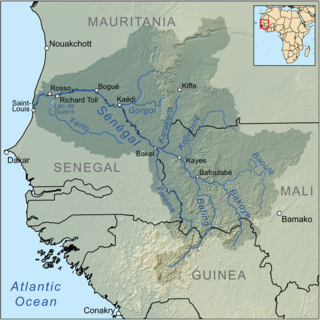
A large-scale, drought-induced famine occurred in Africa's Sahel region and many parts of the neighbouring Sénégal River Area from February to August 2010. It is one of many famines to have hit the region in recent times.

Human rights in Somaliland are protected by Chapter one, Part three of the Constitution of Somaliland. Somaliland is an unrecognised sovereign state in the Horn of Africa, internationally considered to be part of Somalia.

The Chairperson of the African Union is the ceremonial head of the African Union (AU) elected by the Assembly of Heads of State and Government for a one-year term. It rotates among the continent's five regions.

Presidential elections were held in Senegal on 26 February 2012, amidst controversy over the constitutional validity of a third term for incumbent president Abdoulaye Wade. In the runoff on 25 March, Macky Sall defeated the incumbent president. The 2015 documentary film Incorruptible chronicles both campaigns as well as the youth movement Y'en a Marre, which led protests against Wade's administration.

Occurring between July 2011 and mid-2012, a severe drought affected the entire East African region. Said to be "the worst in 60 years", the drought caused a severe food crisis across Somalia, Djibouti, Ethiopia and Kenya that threatened the livelihood of 9.5 million people. Many refugees from southern Somalia fled to neighboring Kenya and Ethiopia, where crowded, unsanitary conditions together with severe malnutrition led to a large number of deaths. Other countries in East Africa, including Sudan, South Sudan and parts of Uganda, were also affected by a food crisis.
2012 had a very severe drought in the Sahel, the semiarid region of Africa that lies between the Sahara and the savannas. Countries included in this region are Senegal, Mauritania, Mali, Burkina Faso, Niger, Nigeria, Chad, Sudan, and Eritrea. Droughts in the Sahel occur quite often and tend to reduce the already meager water supply and stress the economies of developing countries in that region.

Chad currently suffers from widespread food insecurity. A majority of the population of Chad now suffers some form of malnutrition. 87% of its population lives below the poverty line. Because the country is arid, landlocked, and prone to droughts, many Chadians struggle to meet their daily nutritional needs. While international aid into the country has brought some relief, the situation in Chad remains severe due to broader famine in the Sahel region. The World Food Programme has declared a state of emergency in the region since early 2018, stating that, “...adding to the poverty, food insecurity and malnutrition which already affects [the nations of the Sahel] to varying degrees, drought, failed harvests and the high prices of staple foods have hastened the arrival of this year’s ‘lean season’ – the worst since 2014.” Malnutrition is high, especially among women and children, with a significant majority of all children in Chad suffering from some form of stunted growth or adverse health effects as a result. As such, health in Chad is greatly affected by lack of food. Food insecurity is a symptom of broader instability in Chad, which suffers from political, ethnic, and religious instability. These issues have contributed to long-term food insecurity in Chad.
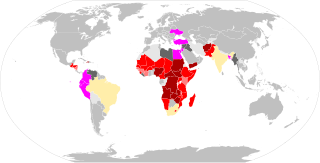
During the COVID-19 pandemic, food insecurity has intensified in many places – in the second quarter of 2020 there were multiple warnings of famine later in the year. In an early report, the Nongovernmental Organization (NGO) Oxfam-International talks about "economic devastation" while the lead-author of the UNU-WIDER report compared COVID-19 to a "poverty tsunami". Others talk about "complete destitution", "unprecedented crisis", "natural disaster", "threat of catastrophic global famine". The decision of WHO on March 11, 2020, to qualify COVID as a pandemic, that is "an epidemic occurring worldwide, or over a very wide area, crossing international boundaries and usually affecting a large number of people" also contributed to building this global-scale disaster narrative.


















